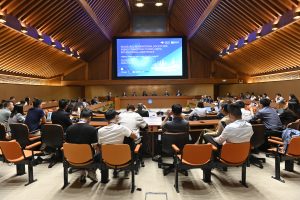The inaugural ISETS conference was held to address energy transition efforts in the Asia-Pacific

The inaugural international conference of the International Society for Energy Transition Studies (ISETS) was held in Bangkok from 16th to 18th October.
The conference, as part of the Asia Pacific Energy Week and a side event of the third Asian and Pacific Energy Forum, was co-hosted by the United Nations Economic and Social Commission for Asia and the Pacific (ESCAP).
Other co-organisers included the Economic Research Institute for ASEAN and East Asia (ERIA), Collaborative Innovation Center for Emissions Trading System at Hubei University of Economics, the Society for the Studies of Climate Finance, and Ember.
Professor Xunpeng (Roc) Shi, President of the ISETS executivite committee, explained the history of ISETS and highlighted its mission of continuously and unbounded knowledge sharing, available to all those in need, regardless of their ability or willingness to pay.
Ms. Armida Salsiah Alisjahbana, Under-Secretary-General of the United Nations and Executive Secretary of the Economic and Social Commission for Asia and the Pacific (ESCAP), opened the Asia-Pacific Energy Week by recognising the pivotal role that think tanks and research institutes, including ISETS, play in facilitating Asia-Pacific’s energy transitions.
“It is impressive to see the extent to which you have managed to assemble expertise and diversity of stakeholders under the ISETS banner.” She said, and “We have joined hands with many ISETS members on these efforts, and we look forward to greater collaboration in the future.” She anticipated that “ISETS will evolve into a valuable hub of knowledge and collaboration, unwavering in its commitment to foster dialogue and effectively gather and share information on technologies, products, solutions and experiences.” Full speech can be found here.
Dr. Xiansheng Sun, the Chairman of the ISETS Council, explained ISETS’s mandate, which is “to collectively steer the global energy ship towards a sustainable, inclusive, and equitable transition, one that embraces carbon neutrality as a shared goal.”
The ISETS conference gathered over 200 energy sector leaders, policy makers and experts, and the discussion highlighted the following issues most pertinent to Asia-Pacific’s transition towards a clean and sustainable energy future.
- The need for achieving a rapid, inclusive, and just transition:The conference attendees collectively recognized the need to transition from high-carbon to low-carbon energy systems to combat climate change. A shared commitment to a just and equitable energy transition was also evident, with a strong emphasis on tailoring policies to local contexts and ensuring the participation and benefit of vulnerable groups.
- Energy security and transition:Attendees recognized the intertwined nature of energy security and transition, emphasising the need to ensure a reliable and stable energy supply during the shift towards cleaner and affordable sources.
- Clean energy investment is a developmental financing challenge:Recognising that clean energy transition is not only about securing sufficient investment for expanding clean energy technologies and systems, especially from the private sector. It also requires ensuring such investment serves as a catalyst for long-term sustainable development.
- The ESG criteria are critical for stimulating private investment:The need for innovative climate finance mechanisms and the use of ESG (Environmental, Social, and Governance) criteria to stimulate private investment in clean energy were highlighted. However, stakeholders were cautioned about the risks of “greenwashing” and “green hushing.”
- Considering the risks in transition:The conference emphasised the importance of considering risks in the transition process, including the potential implications of existing investments in fossil fuels on long-term strategies, as well as geopolitical complexity and uncertainty.
- International cooperation in energy transition:International cooperation was deemed essential for addressing the challenges of the energy transition, emphasising the role of collaboration, innovation, and knowledge sharing.
- Market-oriented policy tools:Market-oriented policy tools, such as ecolabeling and carbon labels, were acknowledged as useful instruments for achieving policy objectives. There were varying opinions on the effectiveness of carbon taxes and emissions trading system, especially in developing countries, with concerns about their implementation and social acceptability.
- Technological advancements:The role of digitalization and technological advancements in decarbonizing transportation and facilitating the energy transition was highlighted, with a particular focus on low-carbon vehicles, sustainable transportation, and digital transformation of the energy system.
- Role of gas and other technologies:Different views on the role of various technologies, such as nuclear and gas infrastructure, alongside renewable energy. Technological advancement has the capacity to extend the technical toolbox for addressing the climate change challenge.
- The viability of CCUS, hydrogen and ammonia:Some considered these technologies vital for deep decarbonization in the long run while others considered them useful only in certain industries.
The ISETS conference also emphasised the following policy options.
- Tailored policy solutions: The conference called for the tailoring of policy solutions to local contexts, incorporating clear investment mobilisation strategies and systemic change, with a focus on inclusivity and societal participation.
- Financial support and investment: Attendees recommended providing financial support to Least Developing Countries (LDCs), reducing the cost of finance for renewable projects, and ensuring the timely availability of finances. Investment in mature technologies ready to scale was encouraged.
- Grid connectivity and collaboration:Improved grid connectivity and collaboration were emphasised, as well as the importance of aligning electricity markets and promoting cooperation and innovation. Collaboration between different regions was encouraged for mutual learning.
- ComprehensiveRisk assessment: Policymakers were urged to conduct comprehensive risk assessments, considering economic, environmental, and social dimensions as integral parts of energy transition policy formulation. Identifying potential trade-offs and developing adaptive strategies to manage risks effectively were also recommended.
- Mitigating the risks of clean energy projects:Increased private investment, combined with smarter support from the public sector and development agencies, is critical for enabling a deep and rapid decarbonisation of the energy sector. There is a need for market and regulatory reforms that could create a stable and predictable investment environment for renewable project investors.
- ESG reporting:The establishment of clear and standardised ESG reporting requirements for companies to enhance transparency and trust in ESG-related investments was recommended.
- Accelerated expansion of renewable energy supply:A strong emphasis was placed on prioritising investments in renewable energy, which have been proven to be cleaner, more cost-effective, and scalable energy sources.
- Holistic approach:While acknowledging the importance of market instrument tools, the emphasis should be on a holistic approach that incorporates various policy measures and initiatives to address complex sustainability and climate change challenges effectively, and to achieve a people-centric transition.
- Global energy trends:Policymakers were advised to closely monitor global energy trends, considering potential geopolitical implications and international conflicts that may arise from both energy-related and non-energy-related factors, as well as their spillover effects.
- Enhancing international collaboration:Multilateral platforms and dialogues were recommended to share best practices and collaborate on energy efficiency and demand, as well as investment attraction, supported by robust regulatory frameworks and market designs.
Youth Voice Competition
On October 17th, 2023, the 1st ISETS Youth Dialogue and the Youth Voice Competition award ceremony took place at the United Nations Conference Center (UNCC) in Bangkok.
The Youth Voice Competition was organised by the ISETS Energy Finance Committee, with valuable support provided by the Climate Finance Research Branch of the Chinese Society of Optimization, Overall Planning and Economic Mathematics.
The theme of the competition is “Equitable and Just Energy Transition”. It is aimed to foster more effective engagement with the younger generations (aged 18-24), inviting them to share their unique perspectives, viewpoints, and insights on energy transition.
Seven teams from across the globe, including China, India, Indonesia, Thailand, and the United States, participated in the event, diving into a range of issues related to energy transition, such as energy poverty, and international cooperation.
The event was chaired by Professor Dayong Zhang, Vice-President of ISETS , and head of the organising committee. Awards were presented to the winning teams by the Chairman of the International Jury of the competition, including Prof. Qiang Ji, Vice-President of ISETS, along with Michael Williamson, Section Chief of Energy Division at UNESCAP, Prof. Farhad Taghizadeh-Hesary, ISETS Vice Presdient, and Prof. David Broadstock from the National University of Singapore.
Dr. Sun Xiansheng, Chairman of ISETS; Prof. Xunpeng Shi, President of ISETS; Mr. Nobuo Tanaka, Executive Director Emeritus of the International Energy Agency; and Prof. Jinjun Xue from Nagoya University participated in the discussion, and highlighted the need to hear more innovative ideas and perspectives from the youth on the topics of energy transition.
A full summary of the conference is available ISETS 1st Conference Summary.

